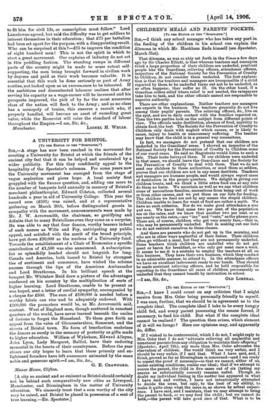CHILDREN'S MEALS AND PARENTS' POCKETS.
[To THE EDITOR OF THE "SPECTATOR."] SIR,—I think any school manager who has taken any part in the feeding of the children in his school can explain the dilemma in which Mr. Hookham finds himself (see Spectator, March 31st).
That dilemma, as was so ably set forth in the Times a few days ago by Sir Charles Elliott, is that whereas teachers and managers think a large proportion of their children are underfed, practical people like the Guardians, relieving officers, attendance officers, inspectors of the National Society for the Prevention of Cruelty to Children, do not consider them underfed. The first explana- tion is that the teachers and managers are irresponsible if a child reported by them to be underfed turns out not to be underfed, as so often happens; they suffer no ill. On the other hand, if a Guardian orders relief where relief is not needed, the ratepayers take him to task, and the other officials named are responsible to superior authority.
There are other explanations. Neither teachers nor managers are experts in the business. The teachers generally do not live among their pupils' parents. The relieving officers, &c., live on the spot, and are in daily contact with the families reported on. Then the two parties look on the subject from different points of view. The officials make destitution, absence of food, inability to obtain food, the test. The Society for the Prevention of Cruelty to Children only deals with neglect which causes, or is likely to cause, injury to health or unnecessary suffering. The teacher may know that the child is in a general way necessitous.
In fact, we managers do not pretend that our children are underfed in the Guardians' sense. I showed an inspector of the National Society for the Prevention of Cruelty to Children some of our worst eases. He said no Magistrate would listen to such a tale. Their looks betrayed them. If our children were underfed in that sense, we should leave the Guardians and the Society for the Prevention of Cruelty to deal with them. That we do not send our children to these authorities, or send them so seldom, proves that our children are not in any sense destitute. Teachers and managers are humane people, and would always report cases of destitution in the proper quarters. We delight in giving our children treats, and we think a little extra food can at any rate do them no harm. We ascertain as well as we can what children come of necessitous families, necessitous from being out of work or from other causes, and we put them on our lists for feeding. The children we feed are not by any means the stupid children. Children unable to learn for want of food are rather a myth. We have no such criterion. Nor do we make good attendance a sine qua non. We know that some two per cent. of the population are on the rates, and we know that another two per cent. or so are nearly on the rates,—are "ins" and "outs," as the phrase goes. There are, of course, children who get very scanty fare,—that is, who may be permanently underfed. But in making out our lists we do not restrict ourselves to these classes.
And there are parents who do not get up in the morning, and who are in other ways neglectful of their duties. Their children often go without a meal, but they are not permanently underfed. Some teachers think children are underfed who do not get meat or bacon for breakfast, or who only get meat once a week. It seems to me it is a mistake to employ the teachers at all on this business. They have their own business, which they conduct in an admirable manner, to attend to. In the attendance officers we have an excellent instrument ready to our hands. They should be made assistant relieving officers, and be held responsible for reporting to the Guardians all cases of children permanently so underfed that they cannot benefit by instruction in school.






































 Previous page
Previous page